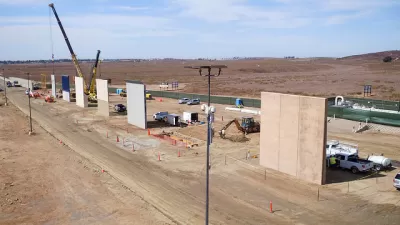One of the nuggets of significance in the Trump Administration's budget draft indicates the president's seriousness about building a wall on the border between the United States and Mexico.

"President Donald Trump wants to hire 20 lawyers to work on obtaining the land needed to build a wall along the Southwest border," reports Joe Palazzol. "He may need more."
"Mr. Trump’s 2018 budget request to Congress asks for the 20 additional Justice Department attorneys to 'pursue federal efforts to obtain land and holdings necessary to secure the Southwest border,'" adds Pallazzo.
Expect a lot of Americans to get a lesson in eminent domain if the Trump Administration moves forward with the border wall plans. According to the article, about 67 percent of the 2,000-mile border is privately or state-owned. Any seizure of land to build walls will require the federal government to demonstrate that the land will be used for public purposes, as well as paying just compensation for the seizure of the land. "It could take months or even years for the Trump administration to bargain individually with the hundreds of private landowners along the border," according to Pallazzo.
Alan Rappeport and Glenn Thursh provide additional coverage of the Trump Administration's budget proposal, focusing on other cuts proposed for other parts of the federal government. After noting the budget's call for 20 new DOJ lawyers, Rappeport and Thrush also report that the "White House is expected to make a supplemental request of $1.5 billion on Thursday to get work started on the wall this year."
Eminent domain is already becoming a reality in Texas, where Melissa del Bosque reports that some property owners along the Rio Grande have already begun to receive a "Declaration of Taking"—legal notice that the U.S. Department of Homeland Security (DHS) wants to build a border wall on private property.
[The Wall Street Journal might be behind a paywall for some readers.]
FULL STORY: Obtaining Land for Trump’s Border Wall a Daunting Task, Experts Say

Maui's Vacation Rental Debate Turns Ugly
Verbal attacks, misinformation campaigns and fistfights plague a high-stakes debate to convert thousands of vacation rentals into long-term housing.

Planetizen Federal Action Tracker
A weekly monitor of how Trump’s orders and actions are impacting planners and planning in America.

Chicago’s Ghost Rails
Just beneath the surface of the modern city lie the remnants of its expansive early 20th-century streetcar system.

Bend, Oregon Zoning Reforms Prioritize Small-Scale Housing
The city altered its zoning code to allow multi-family housing and eliminated parking mandates citywide.

Amtrak Cutting Jobs, Funding to High-Speed Rail
The agency plans to cut 10 percent of its workforce and has confirmed it will not fund new high-speed rail projects.

LA Denies Basic Services to Unhoused Residents
The city has repeatedly failed to respond to requests for trash pickup at encampment sites, and eliminated a program that provided mobile showers and toilets.
Urban Design for Planners 1: Software Tools
This six-course series explores essential urban design concepts using open source software and equips planners with the tools they need to participate fully in the urban design process.
Planning for Universal Design
Learn the tools for implementing Universal Design in planning regulations.
planning NEXT
Appalachian Highlands Housing Partners
Mpact (founded as Rail~Volution)
City of Camden Redevelopment Agency
City of Astoria
City of Portland
City of Laramie




























